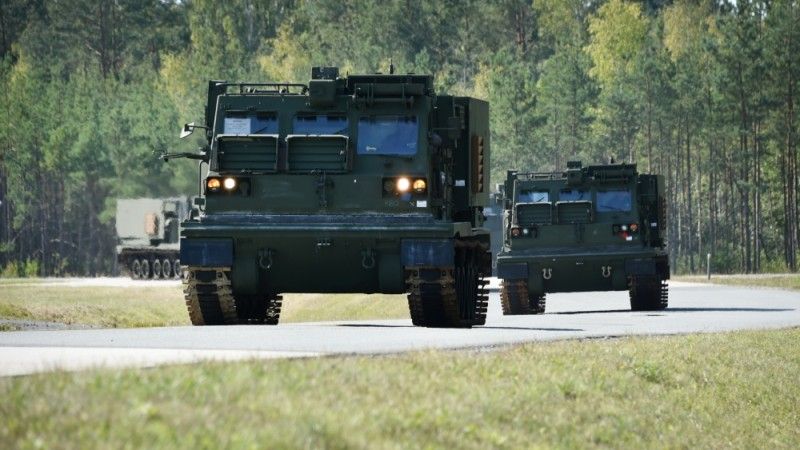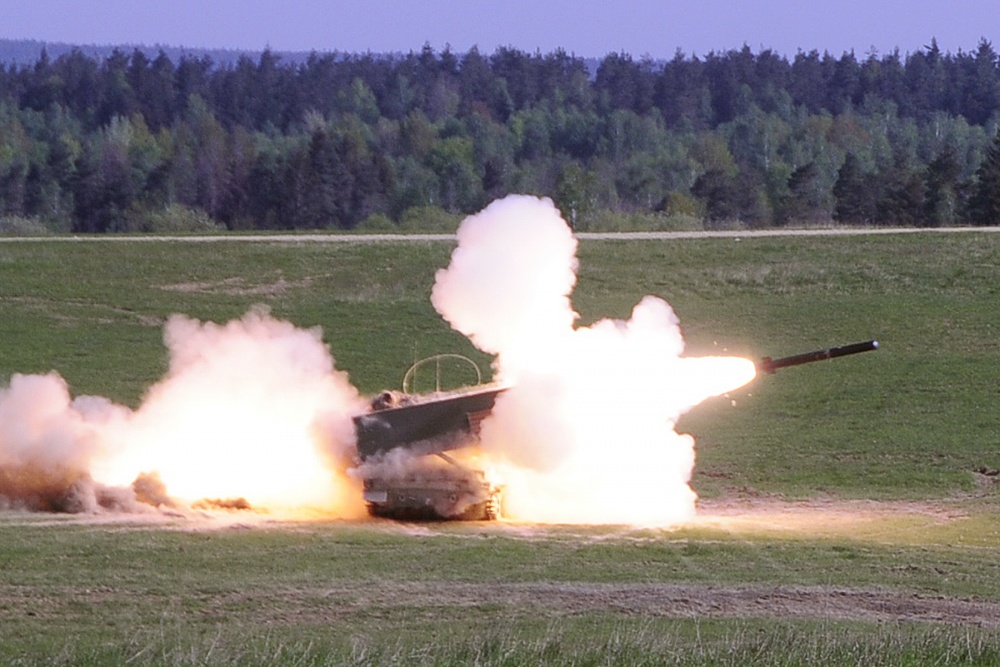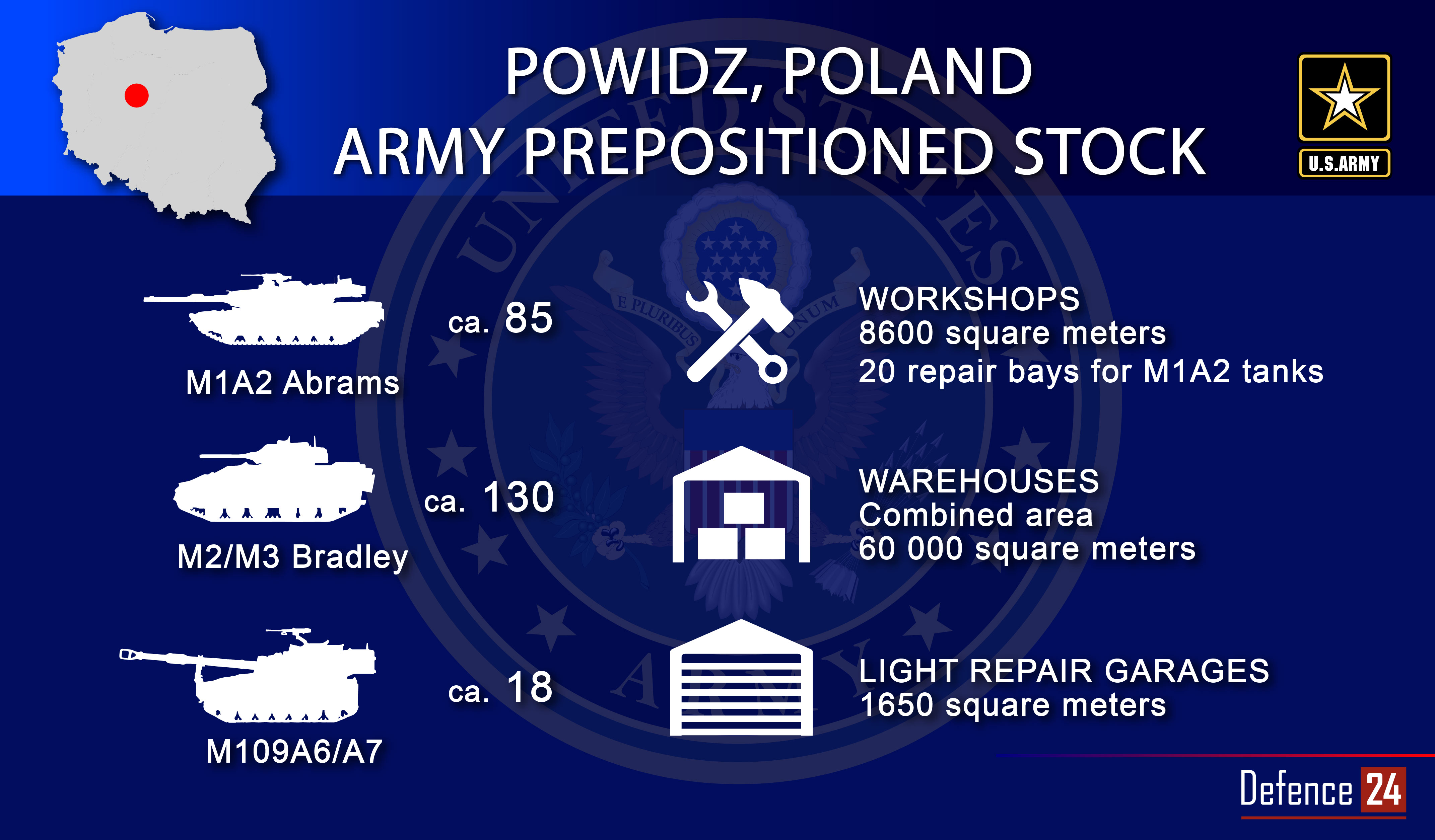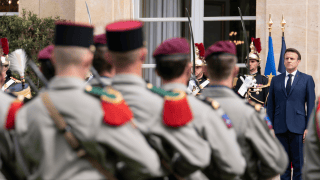- WYWIADY
- ANALIZA
Gen. Hodges: The US Withdrawal from Germany a “colossal mistake” and a gift for Kremlin
General Ben Hodges told Defence24.com that the withdrawal of US forces from Germany would be a „colossal mistake”. During the interview we have also discussed the ways the American Army Prepositioned Stock in Powidz should be protected, as well as the influence of the current situation in US on the American military capabilities and possible German Nuclear Sharing withdrawal.

Jakub Palowski, Defence24.pl: Recently it has been reported that some of the US Forces that are currently being stationed in Germany could be withdrawn to the Continental US, or possibly moved to other European NATO Member States including Poland. How could you comment on that?
General Ben Hodges, former commander of US Army Europe, Pershing Chair in Strategic Studies, Center for European Policy Analysis: First of all, this is just a report. We have not seen a formal announcement. So I am not convinced yet, that is a final decision. However, if this is a final decision, this is a colossal mistake by administration, for several reasons. Firstly, the way it has been rolled out, or leaked out damages the cohesion of NATO. There is no coordination with Germany, there is no coordination with NATO Headquarters or any other Allies. This is not helpful at all.
Secondly, this decision – if the reports are true and it has been finally decided – would be a gift to the Kremlin, since the Kremlin has not changed its behavior in any way that would justify a reduction of American military capability in Europe. The reports that we have seen would mean a nearly 30% reduction of the strength in Europe.
Thirdly, I do not see any connection between the strategic analysis and the numbers. There is no strategic analysis that would mark taking 9500 Army and Air Force soldiers out of more than 34 000 that are currently based in Germany as a good decision. Especially if you consider that during last three years, this Administration has actually increased strength in Germany, and we have just announced new V Corps headquarters. So this would be a complete U-turn, and that is why I think that would be a colossal mistake.
Assuming the reports are true, do you think is it a political decision rather than based on genuine operational planning and interagency, international consultation process? What could be reasoning behind that decision.
If those reports are true, that would be a 100% political decision. As I said, there is no strategic analysis that would lead any professional defense expert and strategic planner to this conclusion and the way it was communicated.
Of course, I don’t know the exact motivation the administration, I can only speculate on that. I think this administration has always felt that Germany should do more, as every administration including president Obama and all his predecessors said that Germany and our Western European Allies should do more. I think that is a part of it.
I think that we should also remember that there is an election year in the United States, and the president has promised to bring home troops from Afghanistan and Iraq. So perhaps this is a part of some political strategy. But I don’t know that, I am only guessing.
Most of the US Forces in Germany are logistic support, enabling forces, stationed there to project power not only in the NATO Eastern Flank, but also to other areas like Middle East and even Arctic. However, there are some typically combat forces, which in case of crisis would have to be moved to the Central and Eastern Europe anyway, such as the recently added rocket artillery and short range air defence units. Do you think such forces could be moved from Germany to Poland for permanent stationing? Assuming that a normal consultation process would take place – and not just “communication by media reports”?
To begin with, the reports that we are discussing demonstrate the lack of appreciation for the reasons why the American troops are in Germany. Germany is a sort of logistic and training hub – a platform centrally located in Europe, which is ideal for power projection, for stationing headquarters units, enablers, logistic units. Those units are in Germany not to protect Germany, but constitute a part of the American contribution to NATO, which protects all of us, including the United States. They enable us to execute our National Defense Strategy in Middle East and Africa.
Referring to your question, America has no stronger Ally than Poland. Poland has done everything that a NATO Member should do in terms of improving its own capabilities and being a reliable Ally, including during operations in Iraq and Afghanistan. But I think that everybody’s security comes from an Alliance where 30 nations are completely committed to each other. And I believe that if United States ordered to move permanent basing, permanently based troops, to Poland or somewhere else in the NATO Eastern Flank, then I think we would run the risk of a real break in the NATO cohesion. It is likely that Western European countries would see this as a violation of the NATO-Russia Founding Act.
And that is why I prefer that we increase US presence in Poland, Lithuania and other Baltic countries as well as Romania using rotational rather than permanent forces, so that we avoid the problem with the cohesion.

The NATO-Russia Founding Act that the Alliance does not intend to deploy substantial, conventional combat forces to the new Member States in “current and foreseeable security environment”. There is a common view, which I also share that Crimea and invading Ukrainie, Russia has broken with that provision and NATO is no longer committed by the Act to avoid permanent stationing of those forces in countries such as Poland. So would, in your opinion permanent stationing of conventional forces in Poland be against the NATO-Russia Founding Act?
If we were in a court, in a juidical process, then you are 100% correct. Russia has essentially abrogated the NATO-Russia Founding Act by its invasion of Ukraine and illegal annexation of Crimea, that has broken the Act, so again – if we were in court, I would agree with you.
But when we speak about deterrence, 30 nations of NATO completely committed to the Alliance, cohesion of the NATO which can withstand the occasional disagreements between the Member States which have always happened, protecting that cohesion is more important than anything. And I don’t believe that this Administration is willing to do the very tough diplomatic work neccesary to build consensus among the Allies that permanent basing of combat forces in Poland helps everybody.
Reaching such an agreement would require a very significant amount diplomatic effort. And I see nothing from this Administration that would tell me they are willing to do that, to get the other nations to agree that NATO is stronger and we are all safer if we have permanently based troops in Poland, Romania, Estonia, Latvia and Lithuania. My second point is that what is really needed in those countries, in addition to the combat forces that are already present there rotationally, is more logistics, engineering, communications, more enablers that would allow a rapid reinforcement. In the US Army, most of that is in the National Guard and in Reserve. They are ideally suited for the rotational service.

Recently we have reported that the Army Prepositioned Stock construction in Powidz is progressing well. As it is supported by NATO funding, all of the Allies agreed to support it. So what is the importance of such an installation and the NATO commitment there, in your opinion?
I am pleased to see that this equipment is going to be prepositioned in Powidz. And remember that was agreed by all NATO Allies during the Summit in Warsaw, back in 2016. The fact that NATO is paying for the storage sites is significant. I think that not enough people realize that it is quite an important commitment by the Alliance. It also represents continuation of policy from one Administration to another, which is also important to demonstrate sustained commitment.
Powidz is situated less than four hundred kilometers from Kaliningrad, so we may suppose it is well within range of Russian Iskander missiles stationed there, as well as other strike systems. Do you think that US or Allied Air and Missile Defence systems need to be deployed there, so that – in case of crisis – this installation is being protected against an aerial/missile attack during the time the equipment is being issued for the US troops flown there from Continental US?
We must be aware that US Air and Missile Defence capabilities in Europe are very limited, so it will have to be Polish Air and Missile Defence that will protect Powidz. Poland will have to take on the responsibility of providing the Air and Missile Defence for Powidz.
We also have to highlight another critical aspect of deterrence – speed of recognition, how fast can we identify that there is a crisis about to happen? Because obviously we want to prevent the crisis from happening. And that is also the reason the equipment will be in Powidz, so we can quickly deploy troops there and signal the Kremlin that we see what they are doing, say: “do not make a terrible mistake”.
So this represents not only an investment but also a commitment to our ally Poland where we share risk and want to prevent the crisis from happening. We need to be able to recognize it sooner. You have to improve the intelligence sharing, information sharing and ISR as a whole, among all Allies. It will not be an American satellite that will first pick up that the crisis is about to be happened, it can be a local military or even a civilian organization, and we need to be able to gather an intelligence together to know that there is going to be a crisis. This is the hard part and challenge.
Let me move back to Germany-related topics for a while. Prominent members of SPD, a major German government party have announced that they will aim for an unilateral German withdrawal from the NATO Nuclear Sharing system. Would such a move affect a NATO cohesion, and how should Allies respond?
First of all, I am confident that Germany will continue its nuclear sharing role. This is such an important commitment of shared risk between Germany and the rest of the Alliance and I think cooler heads, more mature strategic thinkers in Germany will prevail. But it is a fair question to be asked.
Inside Germany for decades, they never liked it, a large part of population never liked to have nuclear weapons there. And that is somehow understandable. It is the role of German leadership, German Government to explain to their population, why is it so important and why nuclear deterrence actually lowers the risk of the conflict. And that Allies expect Germany to provide the leadership.
I can tell you it would be very helpful if Polish leaders would publicly say to their German neighbors and Allies: Thank you Germany – it is so important that you are engaged in the Nuclear Sharing, it reduces the risks not only for neighbors of Germany but for all Allies. If they told it loud and clear publicly, say that they trust Germany and count on them to continue, that would be very powerful.
In my last question I would like to refer to the situation in the United States. We have been witnessing protests over domestic issues, policing, and there is an economic crisis related to coronavirus pandemic. There is also an election year. Do you see the risk that – regardless the election outcome – US leaders will focus on the domestic issues and cut the defence spending to fund the domestic programs?
First of all, I have to tell you that it is so painful for me to watch what has happened in America with the riots, violence in the cities. But nobody in the uniform, nobody in the military wants to see our Armed Forces involved in trying to quell the domestic violence. No soldier wants to have to use force against his own fellow citizens. So there is a real challenge with respect to the civilian authority and the President as Commander-in-Chief, to make sure that the military is not put in the position where it would lose trust and appreciation of the American people.
Do you refer both to deployments of National Guard and the active-duty military or specifically to the discussed potential domestic deployments of active-duty military?
The National Guard belongs to the state as far as domestic missions are concerned (as opposed to its foreign, federal deployments like those we see in Poland). For their domestic missions are trained to helping the governor with certain things, including to act during civil disturbances.
Regarding the potential deployments of the regular Army, the professional Army, there are only very rare situations where the Army deployment would be appropriate. And I do not believe the current situation is appropriate for the active force deployment. This has really been hard to watch.
I think more than anything we need positive leadership, from the President, and from other leaders in America. Positive leadership to reunify our country. We have an election coming in November, and the election, the electoral process in our country is an opportunity where the citizens can vote for another leader if they are not happy with the direction it is coming, or if they are happy with the direction, they may vote to keep the leader. And people have to respect the outcome of the election. So I think it is very important that our leaders lower the temperature and reduce the violence versus what we see now.
But how can this situation affect the defence budget? Focus on domestic programs and increasing deficit could lead to reduction of the US defence capabilities, including in Europe. A similar situation, “sequestration” was seen just a few years ago. Also, half a century ago, Vietnam War-related protests led the US to eventually withdraw from one of the theaters it was engaged (Vietnam).
On one hand, I am sure that the defence budget will come under pressure. Our defence budget, as of now, is adequate. It is sufficient if we are smart on how we spend it, but also if we work better with Allies. The Administration could be more effective in working with all our Allies including Germany and France. Because we need Allies now more than ever.
Answering your question regarding sequestration, I can’t say now what kind of cuts will be looked at, I just say that there certainly will be a downward pressure. I don’t think it will be at the same range as during sequestration because everybody saw how damaging it was. Besides, even though COVID is here, we are still witnessing the same threats. Russia is still a threat, Chinese are increasingly a threat and we still have to worry about Iran and North Korea. So we have to get better at working with our Allies.
Thank you for the conversation.















